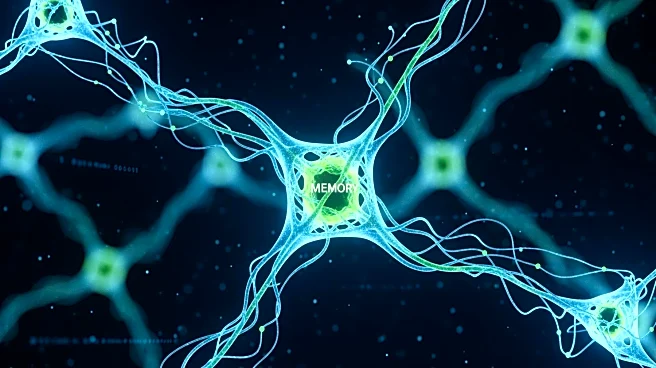What's Happening?
Recent research by AI startup Goodfire.ai has revealed that AI language models, such as GPT-5, utilize separate neural pathways for memorization and reasoning. This discovery was made by analyzing the
architecture of AI models, showing that memorization involves reciting exact text from training data, while reasoning involves solving new problems using general principles. The study found that when memorization pathways were removed, the models lost most of their ability to recall training data verbatim but retained their logical reasoning capabilities. Interestingly, arithmetic operations were found to share pathways with memorization rather than reasoning, explaining why AI models struggle with math without external tools.
Why It's Important?
This research provides valuable insights into the functioning of AI models, highlighting the distinct processes involved in memory and logic. Understanding these differences can lead to more efficient AI models that better mimic human cognitive processes. The findings have implications for improving AI's problem-solving abilities and addressing its limitations in mathematical reasoning. By isolating these pathways, developers can enhance AI's reasoning capabilities while minimizing reliance on memorization, potentially leading to more advanced and versatile AI applications. This research also contributes to the broader understanding of AI's cognitive processes, which is crucial for developing more sophisticated and reliable AI systems.
What's Next?
The next steps in this research involve further exploration of the neural pathways involved in AI processing. Researchers may focus on enhancing AI's reasoning capabilities by refining the architecture of AI models to better separate and optimize these pathways. Additionally, there may be efforts to improve AI's mathematical reasoning by developing new methods that do not rely solely on memorization. This research could also lead to advancements in AI's ability to perform complex tasks, such as mathematical proofs and novel problem-solving, which are currently challenging for AI models. As AI technology continues to evolve, these findings will play a crucial role in shaping the future development of AI systems.
Beyond the Headlines
The distinction between memorization and reasoning in AI models raises important questions about the nature of intelligence and learning. This research challenges the traditional view of AI as merely a tool for data processing, suggesting that AI can develop more human-like cognitive abilities. The findings also highlight the potential for AI to contribute to fields such as education and cognitive science by providing insights into how learning and reasoning occur. As AI models become more sophisticated, they may offer new opportunities for understanding and enhancing human cognition, leading to innovations in both technology and education.









